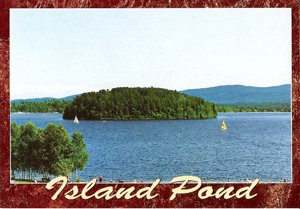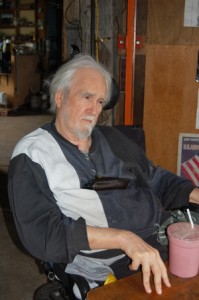

copyright the Chronicle June 4, 2014
by Tena Starr
ISLAND POND — For the last 57 years, Robert Hall of been a member of a small, elite group that includes the likes of actors Mel Gibson, Johnny Depp, and singer Celine Dion. Like those celebrities, Mr. Hall owns a private island.
Johnny Depp’s island is in the Caribbean; Mr. Hall’s island is in Island Pond. He’s reached the point in life, however, where he wants to sell it, ideally to the town of Brighton, which he considers the logical next owner. He’s been in a wheelchair since he broke his back cutting firewood in 1977 and hasn’t set foot on the property for more than 30 years.
It’s hard to navigate a wheelchair through a sandy beach, he wryly noted in an interview Friday. “I can’t use it, but I could use the money.”
Mr. Hall is asking $1.975-million for the island he and his mother bought when he was 18 years old. He’s now 76.
“In 1958, you could buy a whole farm for $5,000,” he said, as evidence of just how dramatically Northeast Kingdom real estate prices have changed over the past six decades.
Bob Cooper, who describes himself as Mr. Hall’s longtime friend and adviser, and who is managing the sale of the island, said the Halls bought it for $50,000, a lifetime’s worth of savings at the time.
The town currently has it appraised at $412,500.
“I don’t know how they came up with that number,” Mr. Cooper said. “But really unusual properties with unusual potential can go for three or four times their assessed value.”
The island was listed for sale in 2007 for $3.4-million, he said, and it had a buyer, according to the real estate agent who held the listing, Mr. Cooper said. However, Mr. Hall decided not to sell at that time.
A potential buyer had an appraisal done two years ago, and it was slightly higher than the current asking price, Mr. Cooper said.
Mr. Hall admits that nearly $2-million is a lot of money for a town to come up with to buy an island. But he believes partnerships could be worked out, so the full price doesn’t fall on taxpayers.
“If the town could come up with the money, I think that’s the logical thing to do with it,” Mr. Hall said. “I think there’s money floating around out there,” he said, suggesting that organizations interested in preserving land, or even donors with a personal interest in preservation, could get involved.
“If the town technically owned it, they could designate someone else to run it,” he said.
The Halls’ purchase was a bit circuitous and maybe even serendipitous. Mr. Hall said that his mother, who lived in Akron, Ohio, wanted to take a trip to Williamstown, Virginia, to see the king and queen of England, who were visiting that historic town. He suggested that, on the way home, they head up the East Coast to Vermont where there seemed to be interesting real estate.
Apparently, his mother agreed to that major sidetrack, and the pair ended up in the Northeast Kingdom viewing property.

Mr. Hall remembers admiring the island from Route 105. “It’s for sale,” a real estate agent told him. So he, or more accurately, he and his mother, bought it.
There aren’t many islands in Vermont, certainly not of size. This one is about 20 acres, has a mature, old-growth, red pine forest, and at the time the Halls bought it also had a log cabin, built maybe, by a Senator Dale, Mr. Hall believes. That could have been either George Dale, or Porter Dale, who were both senators.
It was 1958 when the Halls bought the island, and Mr. Hall was going to college. Three years later, in 1961, he was drafted to fight in the Vietnam War. He survived that, was discharged in 1964, and moved to Vermont where he spent summers on his island.
It was a different time, and a little inconvenience, a little wildness, wasn’t a big deal. With no electricity on the island, Mr. Hall set up a pump, which provided running water, and allowed him to rig up a flush toilet. It was secluded enough that he felt comfortable taking a bath off the beach. Sometimes he’d just sit and watch the waves. “I liked that,” he said.
He had two sailboats that got him back and forth from land to the island, or were just for fun.
There was a time when a steamboat ran between the island and the mainland, but it sank, he believes, although he doesn’t know for sure. He’s also heard that, on their way to Montreal, the island that Roger’s Rangers stopped at might have been his own.
Legends prevail around the island, as they would. An unusual piece of property gives rise to unusual stories.
Mr. Hall recalls showing up on his land once to find a raucous, and nude, party on his beach. “I said, okay. At first it’s something different, but after about five minutes you get used to all the skin, and so what? Not that I care one way or another.”
Although it’s been privately owned land for nearly six decades, it’s not necessarily been treated as such. In fact, it’s been tough to keep the public off from it, Mr. Hall said, although he hasn’t tried all that hard.
Another time, he said, a couple of young women were sunbathing naked on the beach and were accosted by members of a religious community who arrived in a canoe to berate them. He chuckled. “So they went out and dumped the canoe.” He clearly appreciated their feistiness. It’s one thing to be firm in one’s beliefs, another to try to impose them on others, he said.
Mr. Hall spent his summers on the island between his military discharge in 1964 and 1970. He has fond memories, and it’s a lovely place, sort of like an English garden, he said, with its old growth pines and paths through the woods, which are carpeted in pine needles. But since he hasn’t set foot on it, or even seen it, in many years, it’s not particularly hard to let go of it, he said.
The cabin where he once lived has pretty much fallen down now. Although people do visit the island, it’s likely been a while since it hosted a big, nude party. Asked what’s happening on the property these days, Mr. Hall said, “The trees are growing.”
Brighton Administrative Assistant Joel Cope said that, for roughly ten years, the town has talked about acquiring the island “to protect it from undesirable development.”
The town certainly can’t afford $1.9-million, he said. “That was not a number the board thought we could afford, or voters would approve.”
However, there have been conversations with the Vermont Land Trust and others — potential collaborators with an interest in conservation and the financial means to back up that interest.
The state says that the island’s mature, natural red pine stand is one of the few in Vermont that wasn’t planted, Mr. Cope said. Also, it’s the northernmost point where mountain cranberry grows in Vermont. “The state says that’s significant.”
Mr. Hall’s ill health, which has left him hospitalized for a substantial part of the past year, stalled talks with the town for some time.
Anyone, or any organization, such as the Land Trust, needs an appraisal before investing money, Mr. Cope said.
But the appraisal itself became a touchy subject, he said.
“A condition of the appraisal was that Mr. Hall not sell the island while the appraisal was being done,” Mr. Cope said. “The appraisal on this, which is a somewhat unique parcel, is expensive. It looks like it would cost $4,000.”
One of the uncertainties at the moment is who would pay for it, Mr. Cope said. But talks have progressed.
“We may be at a point where we can agree on the terms of a letter outlining the appraisal,” he said last week.
Mr. Cooper said Tuesday that talks with conservationists, the Vermont Land Trust in particular, are briskly moving ahead.
“We’ve been working on this for over two months and we’ve made great progress recently,” he said. “We should have an answer in the next month or so.”
There have also been some bites from the private sector, he said.
“We have a few prospective buyers,” Mr. Cooper said. A couple of them wished to remain anonymous, one couple being rather famous.
“We even have a possible benefactor” with an interest in seeing the land remain undeveloped, Mr. Cooper said.
What the Hall family really wants is to see the island conserved, he said. And he believes the people of Brighton do, too.
“I’ve heard from many people in town, down to a man and a woman, that they would like to see the island preserved,” he said.
He said he feels a great responsibility to the Hall family, as well as to keeping the island undeveloped and in its natural state, as Mr. Hall has done for so long. So he hopes a deal can be brokered where parties who share that interest will step up.
For all intents and purposes, it’s been open to public use over the years. If a private buyer purchases it, that could well end.
In the end, Mr. Cope said, it will be up to the voters of Brighton to decide if the town wants the island or not. Even if the Vermont Land Trust, or some other organization, participates the island won’t come to the town free.
“We’ve been clear all along that unless there is a benefactor there will be some cost share from the town regarding this transfer,” Mr. Cooper said. “The town would be asked by the trust to come up with some portion of the funding for the island going to the town. That amount has not been determined yet.”
contact Tena Starr at [email protected]
For more free articles from the Chronicle like this one, see our Editor’s Picks pages. For all the Chronicle’s stories, pick up a print copy or subscribe, either for print or digital editions.







